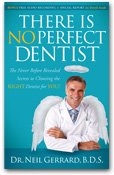Dentures
Dentures have been around for many years and are a popular replacement for missing teeth. Other alternatives include dental implants and bridges.
They look and behave in a similar way to natural teeth and nowadays, are much more comfortable to wear. They can improve facial appearance which is often drawn or sagging due to missing teeth.
What are dentures?
Another name for these is false teeth: they are a dental device which consists of a plate with artificial teeth attached which is held in place by the suction power of your gums. These teeth are produced from synthetic materials such as acrylic resins and ensure that you are able to bite and chew in the same way as with natural teeth.
There are two types of dentures:
- Partial denture
- Complete denture
A partial denture is worn by people who only have a teeth missing whereas the complete denture replaces all of your teeth.
Partial denture
A partial denture is useful at preventing your remaining teeth from shifting out of position due to lost teeth. If there is a gap in a row of teeth then what happens is that the teeth either side start moving out of position due to a lack of support. This shifting of position can cause a whole range of problems such as bone loss around that area.
A partial denture can prevent this and is further boosted by the addition of dental implants. These implants will help to secure the denture in place.
Complete denture
A complete or full set of dentures are worn as a replacement for all of your teeth. This is a good option if you have had all your teeth removed as a result of an accident, illness or injury.
How are dentures fitted?
This process starts with an examination of your teeth to check their condition. Plus it also includes an assessment of your suitability for a denture.
You may require treatment such as an extraction or for gum disease to ensure that your teeth are in good condition before the denture is fitted. This is not so important if you are having a full denture fitted although the health of your gums will be checked.
The dentist will taken an impression of your teeth which is used by a dental laboratory as a guide to producing your new dentures. This impression is done via a mould and dental putty which you bite into it.
The resulting imprint is sent away for fabrication. X-rays may be taken as a further guide.
It is important that the laboratory has the exact measurements of your teeth in order for the dentures to fit correctly.
You may be given a temporary denture – known as an ‘immediate denture’ which is designed to be worn in the intervening period. This enables your teeth and gums to heal if you have undergone treatment as part of your initial preparation for your dentures.
The new dentures will be fitted and if necessary, held in place with a dental implant.
Denture care
Dentures must be kept clean on a regular basis. They need to be removed last thing at night, brushed, rinsed and then left to soak in a cleaning solution.
Brush the dentures the following morning before placing them into your mouth.
If your dentures become heavily stained then visit your dentist for a professional clean. He or she will advise you to attend for check ups on a regular basis to ensure that your dentures remain in a tip top condition.
Dental
Information Guide
- Cosmetic
- Porcelain veneers
- Direct composite veneers
- Cosmetic crowns
- Cosmetic bridges
- Cosmetic fillings
- Direct composite bonding
- Cosmetic orthodontics
- General dentistry
- Dental Fear
- Dental implants
- Endodontic root treatments
- Orthodontics
- Invisible braces
- Fast Acting Braces
- Cosmetic braces
- Conventional orthodontic treatment
- Braces for children
- Tooth decay
- Dental hygiene
- Toothpastes and mouthwash
- Toothbrushing
- Flossing
- Interproximal brushing
- Dental treatment abroad
- Resolving problems
Cosmetic
General dentistry
Dental Fear
Dental implants
Endodontic root treatments
Orthodontics
Tooth decay
Dental hygiene
Latest news
-
Lorem ipsum dolor amet
13 OCT 2010Mauris eros sapien, mollis et varius vitae, mollis id augue...
-
Lorem ipsum dolor amet
13 OCT 2010Mauris eros sapien, mollis et varius vitae, mollis id augue...
-
Lorem ipsum dolor amet
13 OCT 2010Mauris eros sapien, mollis et varius vitae, mollis id augue...
the charity Smile Train
in conjunction with
There is No Perfect Dentist
 Buy The Book
Buy The Book
 Download a
Download a Listen to a
Listen to a  View our
View our